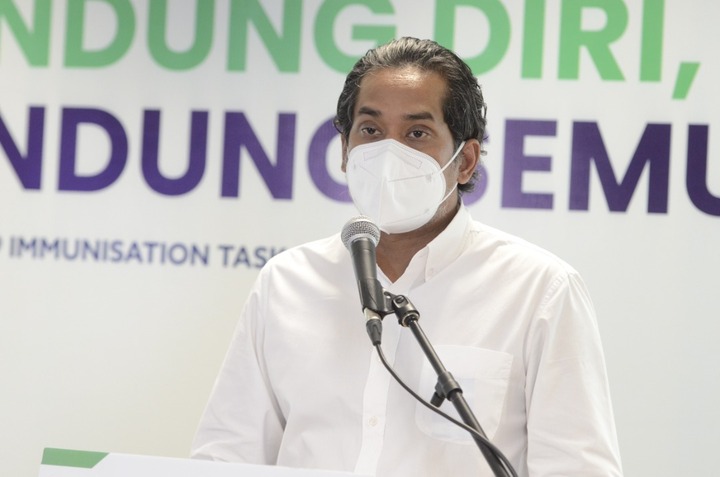KUALA LUMPUR, July 28 — Khairy Jamaluddin maintained today that vaccine supply was the ultimate factor in determining Malaysia’s Covid-19 vaccination rate, saying there are no issues with inoculation capacity.
The vaccine minister pointed out that the average number of daily shots to the arm shot up by 124 per cent to an average 378,000 doses administered a day this month up to yesterday from the daily average recorded in June. This exceeded the initial target of 300,000 daily jabs for July.
Covid-19 vaccine administration spiked to more than 10 million doses given this month, up to today, compared to about eight million doses administered in four months from the start of the National Covid-19 Immunisation Programme (PICK) in late February to June.
The drastic rise in vaccination rates in July came even as about 15.9 million doses are scheduled for delivery to states this month up to July 31, almost triple the 5.7 million supply in June. In May, only about two million doses were delivered to states, while the months of February to April saw delivery of fewer than a million doses each month.
“We certainly do not have problems in terms of vaccine administration capacity as well as the availability of health and non-health personnel,” Khairy confirmed in the Dewan rakyat today.
“However, the delivery of vaccine supplies as well as total doses received from vaccine suppliers remain a key indicator in determining the rate of vaccination in Malaysia.”
As of July 22, Malaysia has a total of 2,313 Covid-19 vaccination centres (PPVs), consisting of various sizes and different vaccine administration capacities.
“The amount of PPVs mentioned does not include PPVs that were opened temporarily through an outreach programme or mobile units that have been implemented in many places across the country,” Khairy added.
The PICK coordinating minister said that besides health care volunteers from the private sector and non-governmental organisations (NGOs), a total of 16,133 non-medical volunteers, including the security team, are also operating in PPVs.
Apart from them, the involvement of health care workers in 1,954 PPVs is also being coordinated through ProtectHealth Corporation Sdn Bhd, a company owned by the Ministry of Health (MOH).
Yesterday, Malaysia administered a total of 553,871 vaccine doses, including first and second doses, the highest-ever daily rate. On July 26, a total of 521,923 doses were administered in the country.
“That makes the amount for vaccination for these two days to 1,075,794 doses with an increase of two per cent of the Malaysian population who received their first dose or equivalent to 692,733 people,” said Khairy.
“Based on statistics released through the Our World in Data website under the University of Oxford, Malaysia’s vaccination rate per capita is among the fastest in the world.”
“The percentage of Malaysians who have received at least the first dose of vaccine surpassed some developed countries, such as Japan, Australia, South Korea and New Zealand,” he added.
As of July 26, according to Our World In Data, Malaysia vaccinated 37.48 per cent of its population with at least one dose, exceeding Japan (37.09 per cent), South Korea (34.17 per cent), Australia (30.79 per cent), and New Zealand (19.18 per cent).
Khairy told Parliament that as of July 25, under the Phase Two of the vaccination programme, a total of 2.9 million senior citizens, or 92.6 per cent of elderly people aged 60 and above who have registered for vaccination, have already received at least the first dose of the coronavirus vaccine. There are some 3.5 million senior citizens in the country, 89 per cent of whom have registered for their shots.
A total of 289,238 people with disabilities and 6.32 million people with comorbidities have received at least one dose of vaccine, or will be given an appointment in the near future.
Khairy noted that as of July 26, only about 61.7 per cent of Malaysia’s total 32.7 million population, or 20.1 million people, have registered for their Covid-19 shots. This comprised 18.8 million adults aged 18 years and above and 1.2 million minors.
About 80.5 per cent of Malaysia’s adult population have registered for vaccination.
“Based on these statistics, it is clear that the number of registrations currently is quite low compared to PICK’s target of 80 per cent of the total population that needs to be vaccinated,” said Khairy.
“In fact, if you look at the vaccination registration statistics in a few states, the registration rate is quite low compared to the thresholds set in the National Recovery Plan for a state to move from one phase to the next.
“However, I understand that a few states may face hindrances with registration because of various geographical and demographic factors who have poor access to communications.”
The science, technology and innovation minister highlighted Covid-19 vaccination outreach programmes and mobile vaccination units in the interiors, such as Orang Asli villages, longhouses in Sarawak, and rural areas in Sabah.
“These outreach programmes have also been expanded to villages that we know have a large senior population who may slip through the vaccination registration system. With this method, registration and vaccination for these recipients will be done immediately. Besides that, mobile units also do house-to-house vaccination for senior citizens, bed-ridden individuals, and people with disability,” said Khairy.








